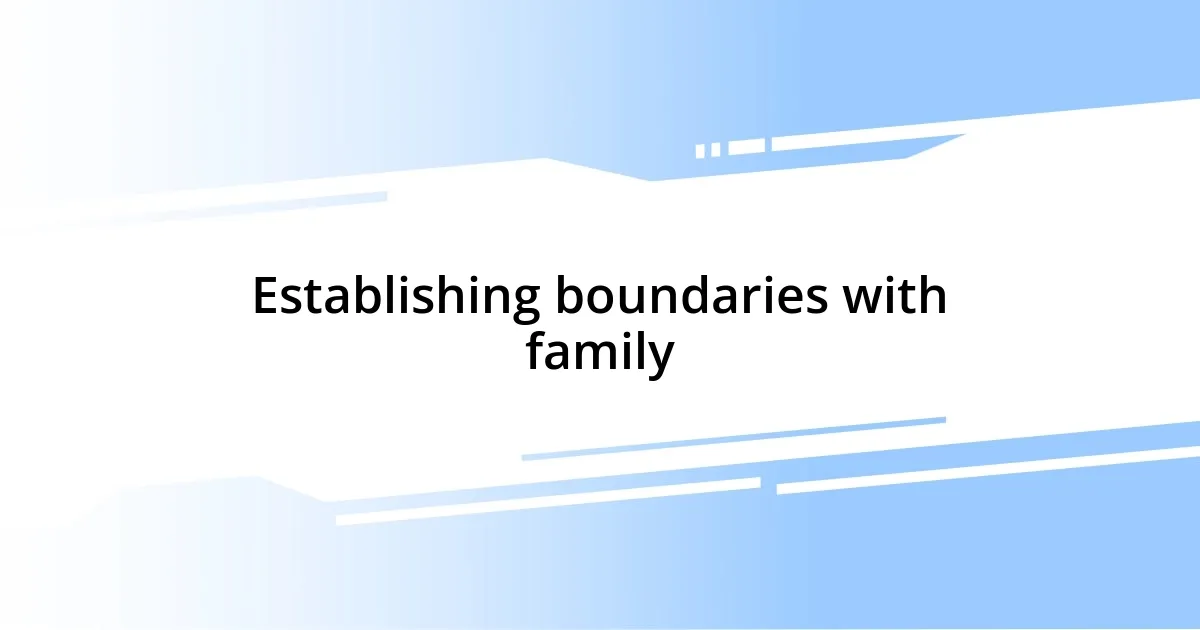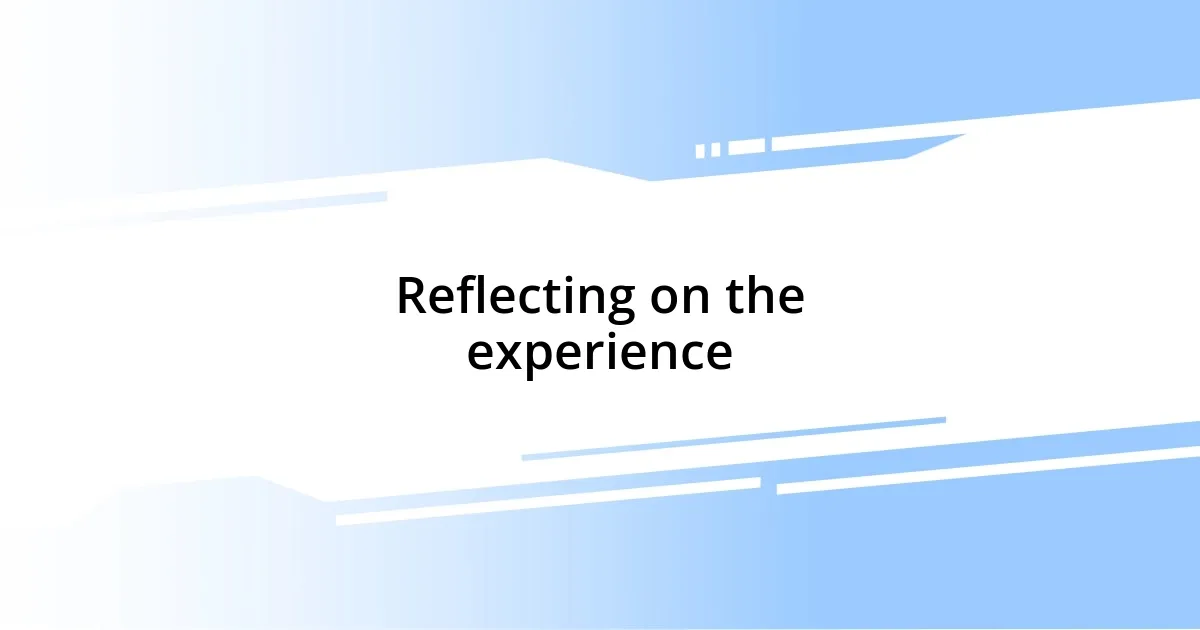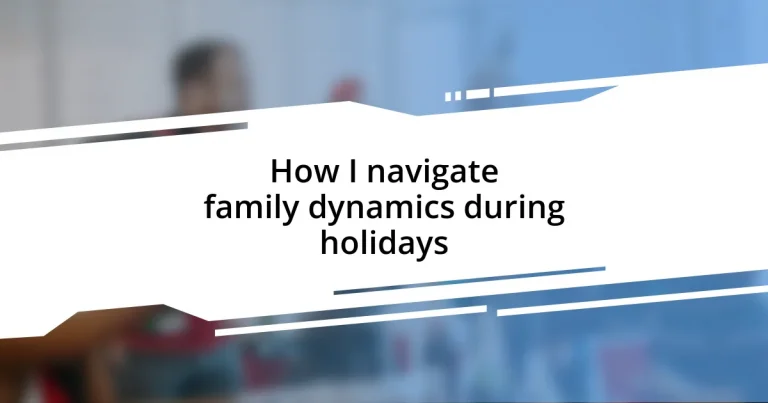Key takeaways:
- Understanding family dynamics involves recognizing emotions, past conflicts, and individual patterns to improve interactions during holidays.
- Identifying stressors such as financial pressures and emotional triggers can help manage expectations and reduce tensions in family gatherings.
- Establishing clear communication and boundaries fosters a positive atmosphere and encourages authentic connections among family members.
- Reflecting on holiday experiences through journaling can enhance personal growth and improve future family interactions.

Understanding family dynamics
Family dynamics can be a complex web of relationships influenced by history, personalities, and shared experiences. I remember one holiday dinner where the tension between my siblings reached a boiling point. It made me wonder, how do our past conflicts shape our interactions in the present?
Emotions play a crucial role in these dynamics. I once found myself soothing my aunt after a disagreement erupted between her and my cousin. Seeing her vulnerability made me realize that behind every argument lies a story, often steeped in feelings that we may overlook amidst the chaos of family gatherings. How often do we pause to consider the emotions driving our loved ones during these high-stress times?
Understanding these nuances can be quite illuminating. One Thanksgiving, I took the time to reflect on how my own reactions mirrored family patterns from my childhood. It struck me that by recognizing these patterns, I could approach conflicts differently. What if we all took a moment to assess our roles within the family? Taking that step could transform the way we navigate our dynamics.

Identifying potential holiday stressors
Identifying potential holiday stressors can truly feel like peeling back layers of an onion. For instance, I’ve noticed that financial pressures often loom large during this time. I remember one Christmas when our budget constraints led to unexpected friction among family members who had differing expectations about gifts. Financial discussions can turn the jolliest of gatherings into sources of tension if not addressed delicately.
Another aspect to consider is the diverse schedules and commitments that come with the holidays. One year, my cousin was trying to juggle kids’ activities, work events, and family time, and I could feel the stress radiating from her. It made me ponder, how many of us hold a mental checklist of obligations that hinder our ability to enjoy the season? Recognizing these competing commitments can help us reframe expectations and manage stress effectively.
Lastly, let’s not forget the emotional triggers that can arise from past family experiences. I recall a discussion erupting over the dinner table about a sensitive family topic that had long been buried. It dawned on me that unresolved issues often resurface during family gatherings. Isn’t it fascinating how our collective histories create a backdrop for stress during what’s supposed to be a joyous occasion?
| Potential Stressors | Example |
|---|---|
| Financial Pressures | Disagreements over gift exchanges |
| Competing Schedules | Juggling multiple commitments |
| Emotional Triggers | Discussions about past conflicts |

Setting realistic expectations
When it comes to setting realistic expectations during the holidays, I find it essential to keep an open mind. One year, I anticipated a picture-perfect family gathering, only to realize that everyone’s moods and situations varied widely. I learned that adjusting my expectations and embracing the unpredictability of family interactions can lead to a more enjoyable experience for everyone involved. The idea is not to have everything go as planned, but rather to appreciate the moments as they unfold.
Here’s a quick checklist to help manage your expectations:
- Acknowledge Differences: Understand that family members may have different emotional needs and experiences shaping their holiday behavior.
- Anticipate Changes: Life situations can change, such as new relationships, jobs, or health issues. Be ready for these shifts and adjust your plans accordingly.
- Focus on Connection: Remember that the goal is to strengthen relationships, not to create perfect memories.
- Practice Flexibility: Embrace spontaneity rather than adhering to a strict schedule. Sometimes, the most memorable moments come from unexpected surprises.
- Plan for Downtime: Allow for moments of quiet or individual time to recharge if needed. I’ve found that stepping away, even for a brief walk, can help reset my mood and mindset.

Creating a communication plan
Creating a communication plan can feel like laying the groundwork for a smoother holiday experience. I remember one Thanksgiving when my brother and I decided to establish a group chat leading up to the big day. This simple step kept everyone in the loop about food preferences and arrival times, which eliminated a lot of the last-minute scrambling that can happen. Isn’t it amazing how a small adjustment can lead to a more relaxed atmosphere?
Establishing clear communication protocols with family can also help mitigate possible miscommunications. For instance, I’ve found that sending out a friendly reminder about our holiday get-together a week in advance eases the anxiety of those who might forget amidst their busy schedules. When everyone is informed, it feels like we’re all on the same page, which really sets a positive tone for the festivities.
Lastly, I believe it’s important to create space for open dialogue during the holidays. There was a Christmas where I fostered a “check-in” tradition, where each family member could share how they were feeling at the moment. This practice allowed us to address any brewing tensions early on and helped cultivate a more authentic connection among us. Isn’t that what the holidays are really about—finding unity amidst our diverse experiences?

Establishing boundaries with family
Establishing boundaries with family can feel daunting, but it’s often necessary for maintaining your peace during the holidays. I remember one holiday when I decided to be upfront about needing time for myself, especially after long days filled with family visitations. When I communicated this honestly, it wasn’t seen as rejecting anyone; instead, it helped others understand that I, too, needed space to recharge.
Setting clear boundaries not only protects your emotional well-being but also sets a standard for respectful interactions. For instance, with my in-laws, I’ve learned to gently but firmly assert what topics are off-limits during our gatherings. This might sound trivial, yet creating a safe environment to enjoy each other’s company without triggering old arguments has made a world of difference. Have you ever felt a certain topic was just too sensitive to dive into? I sure have, and establishing those boundaries saved us from potential conflict.
Sometimes, it’s about being proactive rather than reactive. I’ve found that sharing my boundaries ahead of time—like limiting the hours of visits or stating my preference for no late-night phone calls—creates clarity for everyone involved. This proactive approach transformed one hectic holiday into a more relaxed experience, where we could focus on enjoying each other’s company without underlying tensions surfacing. It’s incredible how setting boundaries can elevate your holiday experience, don’t you think?

Planning engaging activities
When planning engaging activities for the holidays, I find that considering everyone’s interests is crucial. One year, we organized a game night where each family member could suggest their favorite board game. The laughter and playful competition created a bonding experience that I still cherish, and it’s a reminder of how simple activities can spark joy and connection. Have you ever noticed how laughter can break down barriers?
To add a personal touch, I like to incorporate family traditions into our holiday lineup. For instance, last year, we revived a family talent show that my parents used to host. Watching my siblings showcase their quirky talents not only entertained everyone but also celebrated our unique personalities, turning what could have been a typical evening into a memorable gathering. Isn’t it fascinating how tradition can breathe life into our family dynamics?
Another tactic I’ve discovered is balancing structured activities with downtime. It’s important to have a schedule, but I’ve learned to leave room for spontaneity, too. There was a night when, after a planned movie marathon, we ended up sharing stories around the fireplace. That unstructured time allowed deeper connections to flourish and left us all feeling more engaged collectively. How do you find that mix of organized fun and leisurely connection?

Reflecting on the experience
Reflecting on how family dynamics unfold during the holidays often leads me to confront my own feelings and reactions. I recall a particular holiday when an unexpected comment from a family member sent me spiraling. Instead of brushing it off as I might have in the past, I took a moment to acknowledge my feelings. This small shift helped me engage more thoughtfully with my family instead of reacting defensively. Have you ever found that taking a moment to reflect can change the entire course of a conversation?
It’s striking how those reflections can reveal both personal growth and lingering tensions. Sometimes, I find myself revisiting moments that left a mark—a family gathering filled with laughter yet tinged with an undercurrent of unresolved issues. This past Christmas, I realized that embracing those uncomfortable feelings allowed me to approach similar situations differently in the future. It’s like peeling back layers, uncovering what truly matters amidst the chaos. Have you ever found clarity in reflecting on your past experiences?
A practice I’ve adopted is keeping a holiday journal. After the festivities, I jot down what went well and what could use improvement. For instance, I once noted how a simple misunderstanding led to a disagreement that could have been easily avoided with clearer communication. Reflecting on this has empowered me to express myself better, enhancing my relationships moving forward. Do you think putting pen to paper could help you sort through your own holiday experiences?














